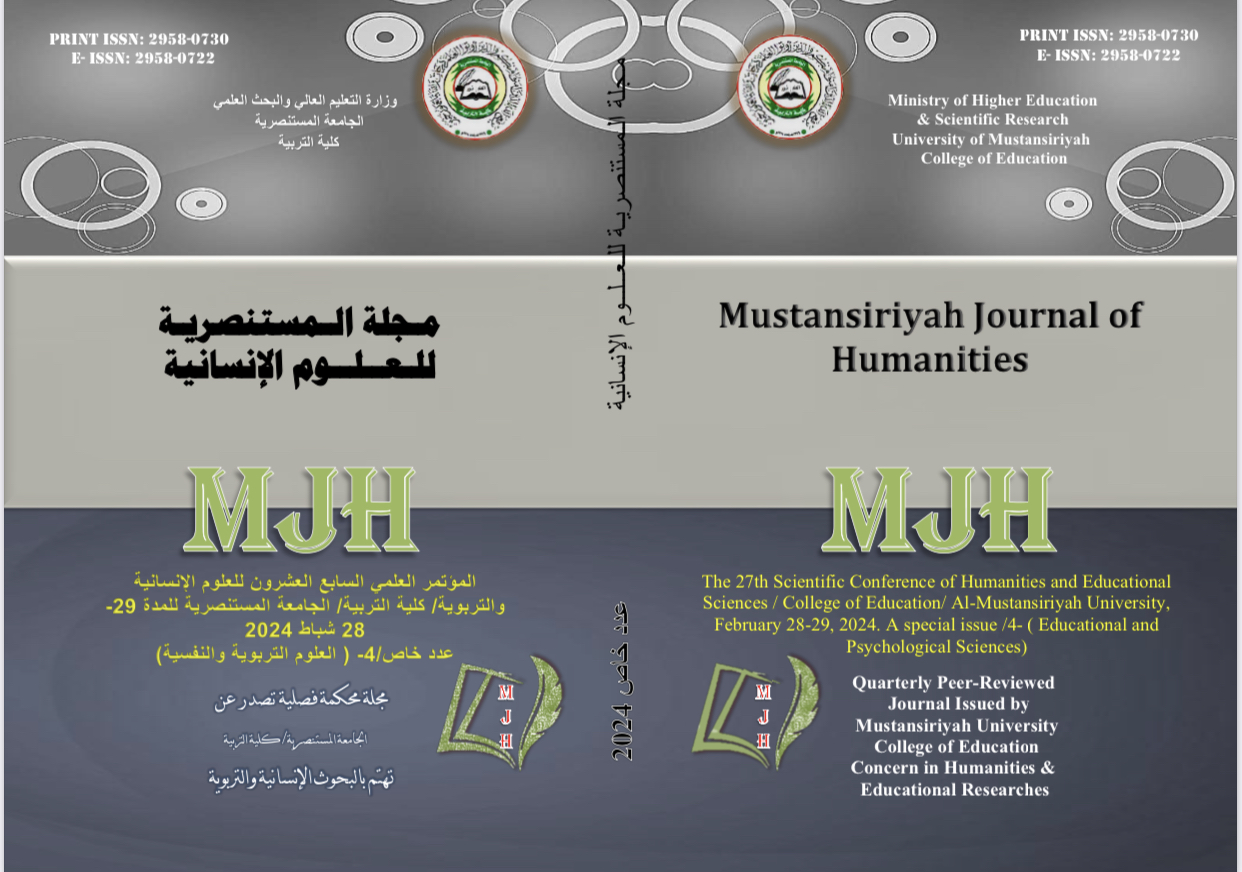Educational and moral values in the philosophy of Imam Ali (peace be upon him) in the psychological reform of man
DOI:
https://doi.org/10.47831/mjh.v4iخاص.529Keywords:
: hadith, turmoil, type, condition. Educational values, Imam Ali’s philosophy, psychological reformAbstract
Human societies need constant review to confront the human weakness that afflicts a person during his confrontation with the battlefield of life. If this confrontation does not occur between a person and himself, this leads to a major division that becomes clear over time in the form of serious psychological disorders, and the issue of psychological reform becomes difficult and the internal psychological and educational reform approach becomes apparent. For the Muslim person through the great biography of Imam Ali (peace be upon him), which the current research takes as a living and authentic model during his rule.
The difficulty of reform appears through two major trends that cannot be overlooked: -
- The culture of resistance to change, which means clinging to the status quo, as nothing is possible to be more creative than it was, and this is what hangs the door to reform, especially in matters of religion and issues of ijtihad, and this is what the Imam, may God be pleased with him, confronted.
- The existence of power centers that benefit from the current situation and fear development to protect their interests and for this reason. It fights reform and renewal. This is what the Imam faced as a condition for assuming the reins of power in preserving the biography of the two sheikhs. He only rejected this trend.
In order for the individual to be psychologically reformed, the following must be done:
- Leadership initiative to confront existing conditions and provide guidance to society and the individual.
- A culture of openness and reform.
- Audience interaction.
The current research will shed light on the policy of the Imam, peace be upon him, in establishing the principles of internal psychological and educational reform for the Muslim person as a true condition for faith, as he is the true pioneer of the issue of reform and psychological and educational organization for the soul that believes in God, His Messenger, and his fragrant biography, during the period in which the Imam assumed power. The leader is the one who institutes reform. An approach to the daily life of the society he ruled, and this is what distinguished the period of the Imam’s rule, and what other rulers abandoned in general and largely in order to preserve the seat of government at the expense of truth, justice, and belief in what is right and forbidding what is wrong, which was completely far from the philosophy of their rule, which sought the world and its joys.
- The research will present the most important prominent signs in the Imam’s rule, through which we seek to achieve reform and distance him from what angers God Almighty and the life of His Most Noble Prophet, through his taking completely bold steps, which are:
- 1-Isolating unfit governors.
- Recovering the public treasury from dishonest hands.
- Establishing supervision over governors and workers, and using strictness with regard to any deviation or violation.
- Equality in giving among the subjects, regardless of who they represented in a previous era.
The research reached the eloquent difficulties that faced the Imam (peace be upon him) in order to achieve his principles for which he persevered despite all the thorny challenges. This is through his saying (You command me to seek victory through injustice against those over whom I have been appointed? By God, I will not improve with him what Samir has nailed and what a star in the sky has completed. If the money was Sweden’s among them, then how about the money is God’s money) and had it not been for his tremendous ability and exceptional immunity in achieving the principles of psychological and educational reform. For man to please God and achieve His principles, which he owes to man when he was able to achieve this eloquent victory despite the hardship, oppression, misunderstanding and great accusations from those around him, the results of which were the wars of the Camel, Siffin and Nahrawan. The research concluded that the Imam’s biography during his assumption of the reins of power was characterized by a great legacy and turning points. It arouses astonishment and astonishment for a great person that cannot be repeated in his treatment of the vocabulary of reform, forbidding evil, and confronting the passions and ambitions that every human being faces. Thus, he has presented to humanity (an extraordinary experience) in practicing the psychological and educational internal reform of the human being, and establishing the foundations of rational justice, as he said about it. Peace be upon you (O people, for I have continued nothing but temptation, and no one else would have dared to do so after its temptation had set in and its anger had grown strong.)
The legendary Imam provided the greatest role model for human psychological and educational reform, to the point that he sacrificed his life as the price for this eloquent approach, in his place of prayer. May God’s peace be upon him, the day he was born, the day he was martyred, and the day he will be resurrected alive.
The research attempts to present him as an effective model, despite the objective awareness of the difficulty of emulating even some of what was covered in his fragrant biography, and it is sufficient for us to present him with love, pride, and trust in God and his creation.” Hopefully, this will provide some remembrance and spark an ideal image.





